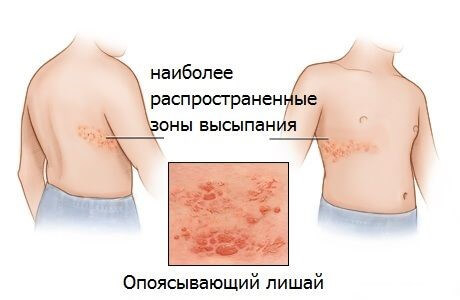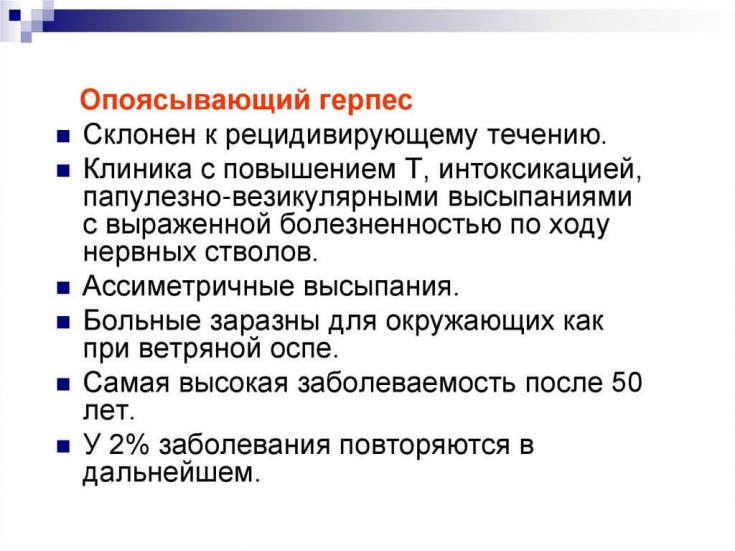Herpes zoster (herpes zoster − HZ) − a viral disease caused by human herpesvirus type 3 (varicella zoster virus - VVZ) and is characterized by:
- inflammation of the posterior roots of the spinal cord, intervertebral ganglia, cranial nerves and ganglia of the autonomic nervous system;
- manifestations of general intoxication;
- vesicular blistering exanthema along the nerves involved.
Often, after the disease, there is persistent pain syndrome, which is difficult to treat conservatively.
For more information about modern methods of preventing this disease, read on estet-portal.com.
- Etiology of herpes zoster
- Clinical studies on the efficacy of the herpes zoster vaccine
- Object and methods of vaccine research as a prevention of herpes zoster
- Results and prospects for the use of herpes zoster vaccinationa
Etiology of herpes zoster
Herpes zoster, also known as herpes zoster, is caused by the same virus as chickenpox (VO).
The virus remains in the body of a person who has had VO, the immune system usually keeps it under control.
Follow us on Instagram!
However, the virus can reactivate as herpes zoster − painful eruptions which lead to prolonged neuralgia.
About a third of people who have had chickenpox have at least one case of herpes zoster.
Although this disease is more common in older people due to a weakened immune system, children can also develop herpes zosterc.
Ganciclovir in the treatment of cytomegalovirus infection
Clinical studies on the efficacy of the herpes zoster vaccine
A team of scientists from the Kaiser Permanente Center for Health Research, Portland, Oregon, USA, led by Dr. vaccinations against varicella in children in the last 10 years.
 "Since the introduction of the varicella vaccine, we have known how effective it is in preventing children from contracting the disease, but we decided to determine whether the vaccine would also reduce the risk of herpes zoster.
"Since the introduction of the varicella vaccine, we have known how effective it is in preventing children from contracting the disease, but we decided to determine whether the vaccine would also reduce the risk of herpes zoster.
study leader Sh. Weinman
Herpes virus in the practice of a dentistObject and methods of vaccine research as prevention of herpes zoster
The study examined the electronic health records of more than 6,300,000 children. Approximately 50% of children were vaccinated during the study period.
 Scientists have found that the risk of herpes zoster is much lower in vaccinated children than in unvaccinated children.
Scientists have found that the risk of herpes zoster is much lower in vaccinated children than in unvaccinated children.
Analysis of the incidence of herpes zoster
was carried out in general and in particular: how many cases were there in 100,000 person-years, including by age and sexResults and prospects for the use of herpes zoster vaccinationOverall, the ratio of HZ cases per 100,000 person-years ranged from 38 to 170 in vaccinated and unvaccinated groups (person-years − the ratio of the number of children included in the study and the amount of time each child was in the study) .
Evidence Based Medicine: Immunomodulators in the Treatment of HerpesScientists attribute this to the fact that increasing vaccination rates during this time reduced
the risk of herpes zoster infection
for all children in general, including the unvaccinated.The decrease in incidence
could also be due to the introduction of the second dose of the vaccine in the Immunization Schedule, since the incidence was significantly lower in children who received not the first, but the second vaccination.What is the danger of infectious mononucleosisThe following
conclusions were drawn
:over the 10-year study period, the incidence in children decreased by an overall 72% as the proportion of vaccinated children increased;
- morbidity in vaccinated children was 78% lower than in unvaccinated children;
- The incidence of herpes zoster in immunocompromised children who failed to receive vaccinations was 5-6 times higher than in non-immune-compromised children.







Add a comment